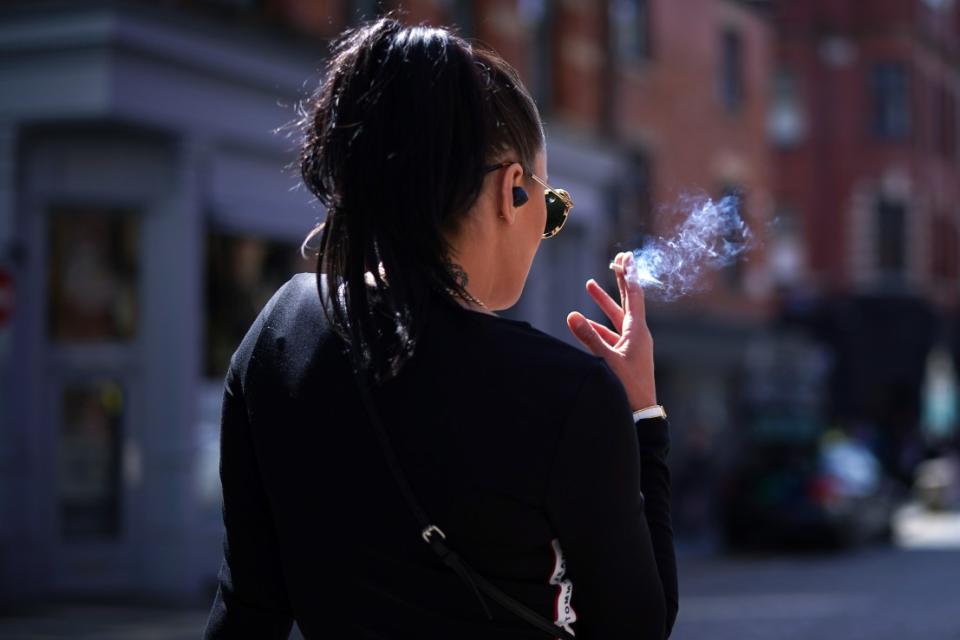Let’s be honest, smoking bans are pointless and will revive a war on drugs

Medellin was meant to be a refuge for rural Colombians escaping political violence. That was until Pablo Escobar’s cartel turned the city into the murder capital of the world. “We had no idea that a shadow was creeping over us,” reads a wall at a recent exhibition. The illicit drug trade has unleashed immense misery across the world – from poppy cultivation funding the Taliban in Afghanistan to knife crime on the streets of London.
Yet Rishi Sunak’s only real legacy could be opening up a new front in the war on drugs. The government wants to ban anyone born after 2008 from purchasing tobacco products, including cigarettes, cigars and even shisha.
This policy initially followed in the footsteps of New Zealand. But in an embarrassing twist for Sunak, the incoming Kiwi government announced plans to reverse the ban last week. Malaysia has also abandoned similar proposals over concerns about age discrimination.
Prohibitionist policies have a similar pattern. There is a righteous demand for a ban followed by inevitable unintended consequences. The most famous case is alcohol prohibition in the United States. The ban fuelled organised crime figures like Al Capone, led to the production of more dangerous and potent alcohol, engendered significant police corruption, and resulted in the rule of law being undermined. In a shocking parallel to partygate, President Warren G Harding was caught drunk on whiskey during an Oval Office meeting in the middle of prohibition.
Bhutan was the only country in modern history to try banning tobacco in 2004, with eerily familiar results. In an academic journal article, political scientist Michael Givel writes that Bhutan’s ban led to “smuggling and a thriving black market”. A World Health Organisation study in 2020 found that the number of 13 to 15 year old tobacco users increased to 22 per cent after this policy was introduced. The uptick in underage smoking may be because once criminals get going they have no reason not to sell to children, unlike legitimate retailers which could lose their licence. Bhutan’s ban was lifted in 2021.
The UK’s tobacco ban would initially lead to an absurd situation whereby a 19 year old would be able to sell legally purchased cigarettes to their 18 year old mates
The UK’s tobacco ban would initially lead to an absurd situation whereby a 19 year old would be able to sell legally purchased cigarettes to their 18 year old mates. Over time, however, the trade would be taken up by criminal gangs, who could syphon billions of pounds from government coffers for their own pockets. The UK government is already losing billions yearly to the illicit trade. HMRC estimates that one in nine manufactured cigarettes and one in three hand-rolled cigarettes are bought illegally. This will only grow as tobacco is phased out.
The arguments for prohibition are incredibly flimsy. It’s untrue that most smokers want to quit, just one in five express a strong desire to cease, and even then, very few have an immediate intention. Smokers also more than compensate for the burden they place on the NHS by paying an immense amount of tobacco duty – £10bn annually – and (darkly) dying younger.
With shockingly little public debate, the UK is on the cusp of taking away the freedom for adults to decide what enters their bodies. Tobacco prohibition risks having the usual miserable outcomes. “We suffer death as a tool of war,” said one Medellin resident about Escobar’s antics, “at the hands of drug traffickers, assassins, militias, police, gangs and self-defence forces.” Hardly a welcome future.
Matthew Lesh is director of public policy and communications at the Institute of Economic Affairs

 Yahoo Finance
Yahoo Finance 